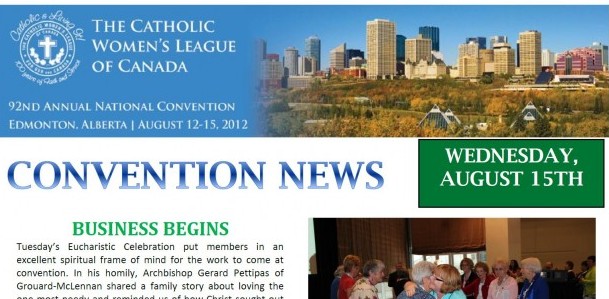



100 years of Catholic women in action
Alicia Ambrosio
Wednesday, August 22, 2012

The Catholic Women’s League (CWL) has is determined to push for the criminalization of purchasing sexual services, and for employment insurance benefits for adoptive mothers. The group made the announcement at the end of their annual convention August 17.
The announcement might come as a surprise to many Canadian Catholics. The CWL is most often associated with the parish ladies who serve coffee and donuts after Mass, hold bake sales, and generally take care of whatever needs to be taken care of in the parish – any parish. What many people don’t know is that those unassuming women work as a lobby group of sorts to change legislation in our country, and support social justice projects around the world.
In her last press conference as the league’s national president Velma Harasen told journalists a CWL delegation visits Ottawa every year to meet with a Member of Parliament. “We sit with them and talk to them about the resolutions we’ve passed, the issues we’re concerned with.” Meanwhile, women across the country send letters to their M.Ps about those very same issues. The combination of direct, face-to-face discussion and grassroots letter writing campaign can make an impact.
In 2010 the federal government amended the Hazardous Products Act, adding an annex to regulate the levels of lead that can be present in the surface coating of children’s toys and making warning labels necessary on objects that contain more than 90mg/kg of lead. Harasen recalled, “we were very pleased when we saw a minister get up in parliament and propose a bill that would regulate lead levels in children’s toys.” She added, “we met with one minister shortly after and we told the minister that we had been pushing for that regulation. The minister smiled knowingly and said ‘we know’”
It should come as no surprise that the CWL doesn’t hesitate to jump into legislative matters. Their founder, Katherine Huges, was a journalist who covered provincial parliament in Alberta. She was quick to identify needs in the community and didn’t shy from taking charge to respond to those needs.
Hughes was an a-typical Catholic woman for her times. Originally from Prince Edward Island, she was educated in Charlottetown and became a teacher. From that point her life veers away from what would have been the norm for a woman of her day.
Hughes - the second youngest of nine children and the niece of Cornelius O'Brien, the Archbishop of Halifax until 1906 – became a teacher and taught school on a Mohawk reserve. She worked there until 1902 when she went on to pursue “literary work.” She dedicated herself to writing and was published in various publications across the country. Eventually she became a writer for the Montreal Daily Star and while employed by the Montreal paper, she helped found the Canadian Women's Press Club. To be precise, she founded the club while on a train to St. Louis, Missouri, for the World's Fair.
Two years later Hughes moved on to a writing position at the Edmonton Bulletin. There she reported on sessions of the Alberta Legislature. This sensitized her to political and government issues. While in Edmonton she remained active in the Canadian Women's Press Club and other women's organizations.
Perhaps it was her own experience of moving across the country that made her aware of the phenomenon of young women arriving in the Alberta capital, alone, unemployed, and in need of a warm welcome. She knew that in England there were organizations offering young immigrant women a place to stay and assistance in finding a job.
A proactive woman, Hughes approached Bishop Legal and Abbé Casgrain with her desire to do something to assist the Catholic immigrant women arriving in Edmonton. The two men agreed that something needed to be done to welcome these women, and encouraged Huges to forge ahead with her desire to establish some sort of organization for this purpose
That was how, in February 1912 women from seven Edmonton parishes met at St. Joachim’s Church to discuss how they could help immigrant women. Their goal was to provide temporary housing and assistance in finding employment.
Within the year the Catholic Women’s League had a women’s hostel and an employment bureau. By the spring of 1913 the CWL was meeting every train that arrived in the city.
One of the things Hughes insisted on was that the league be structured in such a way that it could be adopted anywhere in the country. Her forethought allowed the league to spread quickly across the country. Soon there were councils in Montreal and other parts of Quebec. In 1920 the first national CWL president was elected and the CWL became a major force helping the integration of immigrants.
Today there are CWL councils in every province and most territories across the country. Each council responds to the needs of their community through direct action and support.
As one CWL member explained when asked why she joined this group instead of one of the other Catholic women’s groups, “some of those other groups are about prayer and action, the CWL is about action and prayer, and I’m a woman of action.”
Related Articles:
<<
SUPPORT LABEL
$50
$100
$150
$250
OTHER AMOUNT
DONATE
Receive our newsletters
Stay Connected
Receive our newsletters

Stay Connected







